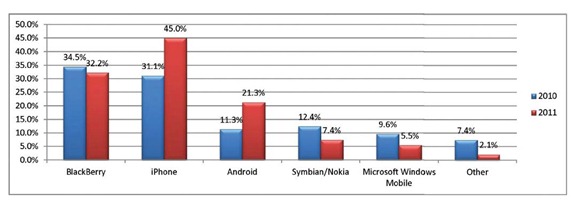Last time we discussed which mobile operating system would be best for you, as a consumer. In the end, it came down to personal preference. There are positives and negatives for each design. Easy-to-use and smooth design lends itself to an iPhone, while versatility and customization lead you to Android.
When it comes to smart phones in an enterprise situation, consumer preference can find itself on the back burner. Data/document management, overall security, and actual phone performance drive decisions.
RIMM (Blackberry) had long been the fearsome leader in the enterprise market. If you were a corporate professional, you were using a blackberry; simple as that. They led the way in messaging, email, and data management. Recently, however, there has been a noticeable shift in enterprise smart phone use.
The recent iPass Mobile Workforce Report Q4 2011 exposes a few of the trends seen in the changing market. The two biggest reasons for shifts in smart phone usage revolve around the changing business structure and a less structured business environment.
First, mobile business is not limited to email anymore. Apps rule the day and a desire to browse the internet help to explain how iOS and Android are gaining ground (or passing) RIMM. Second, corporations are less likely to issue their own smart phones to employees. There is a move to blend an employee’s personal phone with the business environment instead of rigid smart phone control as the idea of mobile working blurs the lines of business and personal.
As can be seen from the image below, iOS and Android saw huge upticks in market share with Apple leading the way. While Blackberry is holding on, the ever-changing workforce indicates that Android will soon overtake them for second in enterprise market share.
Over the past couple of years, as Apple and Google have worked towards expanding their footprint, they have put great effort in to solving business issues as an effort to make themselves worthy RIMM competitors. Most notably, we see the importance of document control and overall security concerns as features that are changing the OS market share. Important features include things like the use of complex passwords and the ability to wipe a phone’s data remotely are present on RIMM and iOS early on have been integrated in to Android in recent updates. And, of course, exchange/mail support has been standardized across the board.
However, there are areas where the “newer” enterprise participants lag behind Blackberry. Android and Windows Phone 7 properly run each application in a sandbox preventing what outside information may be accessed by an application (and giving you notice of what it may access). You can choose to not install apps should they violate any perceived privacy.
From InformationWeek, we can see that enterprise readiness of each operating system still fights with Blackberry’s RIMM in feature-set. With iOS, while it does provide encryption preferred by enterprise environments, the keys for that encryption are found on the phone. An attacker would have access to such things and puts a big dent in iOS’ enterprise credentials. For Android, you need the newest of the new phones running the Ice Cream Sandwich operating system for proper encryption. Windows phones don’t even attempt such features currently.
Past the nitty-gritty importance of security and enterprise integration, the choice of operating system always comes down to a few personal choices. Within the scope of business, I would focus on usability and comfort.
With concerns on comfort, no physical keyboard on iPhones means that those looking for some actual keys to press will have to look at Android for their phone. It is often overlooked, but excess typing on a screen can be uncomfortable, especially in a work environment. As for usability, iOS features like Siri and the ever present massive app store (combined with the previously mentioned walled garden) put the iPhone ahead of the pack in expected performance. You can find an app to do what you want and you know the phone will perform flawlessly repeatedly. Knowing that the app and phone will do what you want, when you want is the bottom line decision maker for enterprise customers.
There are countless areas to grade and measure when making a decision. But, the negatives that may appear from Android strike me as insignificant when looking at device encryption and security. Android has caught up to RIMM and iOS in regards to passwords and wiping ability and they lead the pack in device encryption and data protection. That is hard to ignore. While usability and style may be second to an iPhone, it looks as though Ice Cream Sandwich running on a Galaxy SII is the enterprise choice to make. You cannot choose style when security is put in to question.



No comments:
Post a Comment